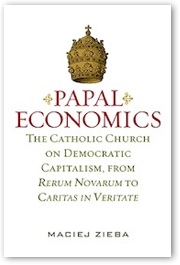Papal Economics
- MACIEJ ZIEBA, OP
"For a long time to come, this book may well be the definitive work on the economic teaching of the modern popes." - Michael Novak
 |
On March 13, 2013, white smoke emerged from the chimney of the Sistine Chapel, signaling that the Catholic Church had elected a new pope. The latest successor of St. Peter was Cardinal Jorge Mario Bergoglio, archbishop of Buenos Aires, Argentina, who became known as Pope Francis. Initial reports focused on the firsts associated with his papacy: he was the first pope from the Americas, the first Jesuit pope, and the first pontiff to take the name Francis. Commentators quickly tried to gauge the direction the Church would take under Francis's leadership. Much of the speculation, particularly from the secular press, centered on how the new pope would address people of other religions, handle the Roman Curia, respond to abuse scandals within the Church, and treat issues such as same-sex marriage, abortion, and contraception.
Less discussed, but equally important, was the question of how Pope Francis would influence Catholic social teaching. What is man's place in society, particularly in economic and political life? How should we regard the institutions of democratic capitalism that have become the model for so much of the world? These questions could not be ignored, especially given the damage wrought by the global economic crisis that began in 2007.
There is, in fact, a well-developed body of Catholic social teaching on the economic and political order. This teaching can be traced back to the social encyclical Pope Leo XIII issued in 1891, Rerum Novarum. In the more than 120 years since, Leo's successors have built on this encyclical with further teachings on capitalism and socialism, wealth and poverty, democracy and authoritarianism, and more. The importance of Rerum Novarum is reflected in the timing of several subsequent social encyclicals. For example, Pope Pius XI's Quadragesimo Anno — released in 1931, during the Great Depression — was published on the fortieth anniversary of Leo's landmark encyclical; Mater et Magistra (1961) commemorated the seventieth anniversary; Pope John Paul II's Laborem Exercens (1981), the ninetieth; and John Paul's Centesimus Annus (1991), the hundredth.
Other social encyclicals dealing with economics have appeared as well — including, in 2009, Pope Benedict XVI's Caritas in Veritate — but ultimately it is Centesimus Annus that stands out. John Paul's encyclical is at once in sync with a grand tradition of Catholic social thought and a work of real innovation.
To begin, Centesimus Annus provides the most comprehensive answer to a deceptively challenging question: What is the Church's position on democratic capitalism? For decades commentators of all stripes have tried to enlist Catholic social teaching in their cause, variously arguing that it is left-wing or right-wing, pro-socialist or pro-capitalist or even pro"third way." Such interpretations illustrate what the Acton Institute's Samuel Gregg calls "the limits of applying secular political categories to something like the Catholic Church."
|
In my new book, Papal Economics, I aim to correct the misconceptions about the Church's teachings on economics. Although the teaching has evolved in certain important respects over more than a century, the social encyclicals display a continuity that many observers have missed. As early as Rerum Novarum in the nineteenth century, popes rejected socialism as wrong at its core — as "proposing a remedy far worse than the evil" it was designed to cure, in the words of Quadragesimo Anno. Moreover, it is clear, especially from Centesimus Annus, that a democratic state characterized by the rule of law and endowed with a market economy deserves praise and respect as a place in which human freedom can find expression.
Of course, this praise and respect cannot be unqualified. In taking a comprehensive approach, the encyclicals outline the dangers associated with democratic capitalism as well as the opportunities. In any case, the Church's teaching on economics and politics is not about endorsing particular social institutions or designing ones of a more "confessional" shape. It reminds us, more broadly, of the relationships between man, society, and the state and of the preeminence of culture over politics and economics.
Catholic social teaching thus makes an essential contribution in moving beyond the narrow confines of secular discourse. The most serious dangers arise when the state and the market are elevated to absolutes in themselves — when man's spiritual dimensions are subordinated to his material ones. The market economy and the democratic order must operate in a larger culture that allows man to discover the transcendent dignity of each person and realize his humanity by giving himself to his fellow men and to God.
In short, the very survival of democratic capitalism depends on a culture rooted in transcendent truth. For, as Pope John Paul II suggests in Centesimus Annus, in a world without truth, freedom loses its meaning, the market loses its efficiency, and democracy yields to statism and even totalitarianism.
 This is Meaghen Gonzalez, Editor of CERC. I hope you appreciated this piece. We curate these articles especially for believers like you.
This is Meaghen Gonzalez, Editor of CERC. I hope you appreciated this piece. We curate these articles especially for believers like you.
Please show your appreciation by making a $3 donation. CERC is entirely reader supported.

Acknowledgement
Maciej Zięba, OP. "Papal Economics." excerpt from Papal Economics: The Catholic Church on Democratic Capitalism, from Rerum Novarum to Caritas in Veritate (Wilmington, DE: ISI Books, 2013).
Reprinted with permission of ISI Books, the publishing imprint of the Intercollegiate Studies Institute.
The Author
Maciej Zięba, OP, is a founder of the Tertio Millennio Institute, former director of the European Solidarity Centre, and former provincial superior for the Dominicans of Poland. He is one of the foremost interpreters of the thought of Pope John Paul II and is the author of Papal Economics: The Catholic Church on Democratic Capitalism, from Rerum Novarum to Caritas in Veritate.
Copyright © 2013 Intercollegiate Studies Institute




